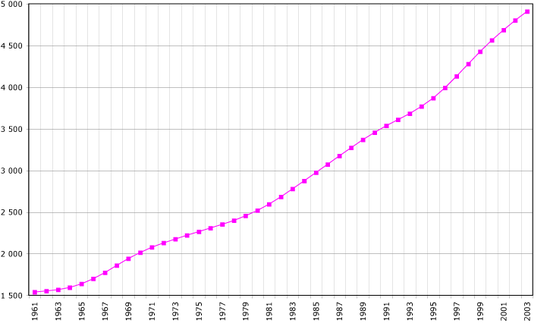Demographics of Togo
2007 Schools Wikipedia Selection. Related subjects: African Geography
Togo's population of 4.8 million people ( 2002 est.) is composed of about 21 ethnic groups. The two major groups are the Ewe in the South and the Kabye in the North. Other groups include the Akposso on the Central Plateau, the Bassar in the Centre-West, the Cotocoli, the Tchamba and the Komkombas around Sokodé, the Lambas in the Kante region, the Haoussas and the Mossis farther in the North. Among the others groups can be found the Tamberma, the Guin, the Losso, the Ouachi and the Gourma.
Population distribution is very uneven due to soil and terrain variations. The population is generally concentrated in the south and along the major north-south highway connecting the coast to the Sahel. Age distribution also is uneven; nearly one-half of the Togolese are less than 15 years of age. The ethnic groups of the coastal region, particularly the Ewes (about 21% of the population), constitute the bulk of the civil servants, professionals, and merchants, due in part to the former colonial administrations which provided greater infrastructure development in the south. The Kabye (12% of the population) live on marginal land and traditionally have emigrated south from their home area in the Kara region to seek employment. Their historical means of social advancement has been through the military and law enforcement forces, and they continue to dominate these services.
Most of the southern peoples use the Ewe or Mina languages, which are closely related and spoken in commercial sectors throughout Togo. French, the official language, is used in administration and documentation. The public primary schools combine French with Ewe or Kabye as languages of instruction, depending on the region. English is spoken in neighboring Ghana and is taught in Togolese secondary schools. As a result, many Togolese, especially in the south and along the Ghana border, speak some English.
Population: 5,018,502
note: Estimates for this country explicitly take into account the effects of excess mortality due to AIDS; this can result in lower life expectancy, higher infant mortality and death rates, lower population growth rates, and changes in the distribution of population by age and sex than would otherwise be expected ( July 2000 est.)
Age structure:
0-14 years: 46% (male 1,161,610; female 1,153,877)
15-64 years: 51% (male 1,254,437; female 1,327,306)
65 years and over: 3% (male 53,101; female 68,171) (2000 est.)
Population growth rate: 2.7% (2000 est.)
Birth rate: 38.02 births/1,000 population (2000 est.)
Death rate: 11.18 deaths/1,000 population (2000 est.)
Net migration rate: 0.16 migrant(s)/1,000 population (2000 est.)
Sex ratio:
at birth: 1.03 male(s)/female
under 15 years: 1.01 male(s)/female
15-64 years: 0.95 male(s)/female
65 years and over: 0.78 male(s)/female
total population: 0.97 male(s)/female (2000 est.)
Infant mortality rate: 71.55 deaths/1,000 live births (2000 est.)
Life expectancy at birth:
total population: 54.69 years
male: 52.75 years
female: 56.7 years (2000 est.)
Total fertility rate: 5.5 children born/woman (2000 est.)
Nationality:
noun: Togolese (singular and plural)
adjective: Togolese
Ethnic groups: native African (37 tribes; largest and most important are Ewe, Mina/Gen, and Kabre) 99%, European and Syrian-Lebanese less than 1%
Religions: indigenous beliefs 50%, Christian 35%, Muslim 15%
Languages: French (official and the language of commerce), Ewe and Gen (the two major African languages in the south), Kabye (sometimes spelled Kabiye) and Dagomba (the two major African languages in the north)
Literacy:
definition: age 15 and over can read and write
total population: 51.7%
male: 67%
female: 37% (1995 est.)
Algeria • Angola • Benin • Botswana • Burkina Faso • Burundi • Cameroon • Cape Verde • Central African Republic • Chad • Comoros • Democratic Republic of the Congo • Republic of the Congo • Côte d'Ivoire (Ivory Coast) • Djibouti • Egypt • Equatorial Guinea • Eritrea • Ethiopia • Gabon • The Gambia • Ghana • Guinea • Guinea-Bissau • Kenya • Lesotho • Liberia • Libya • Madagascar • Malawi • Mali • Mauritania • Mauritius • Morocco • Mozambique • Namibia • Niger • Nigeria • Rwanda • São Tomé and Príncipe • Senegal • Seychelles • Sierra Leone • Somalia • South Africa • Sudan • Swaziland • Tanzania • Togo • Tunisia • Uganda • Western Sahara (Sahrawi Arab Democratic Republic) • Zambia • Zimbabwe
Dependencies and other territories
British Indian Ocean Territory • Canary Islands • Ceuta • Melilla • Madeira Islands • Mayotte • Réunion • St. Helena
